“Babangida Claims Giwa Murder Was Part of ‘Destabilization Plot’—But Denies His Role”
 Former military president, General Ibrahim Badamasi Babangida, has revisited the long-unsolved murder of journalist Dele Giwa in his newly released autobiography, A Journey in Service. In Chapter 10, titled “The Challenges of Leadership,” Babangida reflects on the tragedy, which continues to haunt Nigerian history.
Former military president, General Ibrahim Badamasi Babangida, has revisited the long-unsolved murder of journalist Dele Giwa in his newly released autobiography, A Journey in Service. In Chapter 10, titled “The Challenges of Leadership,” Babangida reflects on the tragedy, which continues to haunt Nigerian history.
Babangida, who served as Nigeria’s Head of State when Giwa was murdered, expressed his hope that the truth behind the killing would one day be revealed, though he vehemently denied any involvement by his administration. Giwa, the respected co-founder and editor-in-chief of Newswatch magazine, was tragically killed on October 19, 1986, when a parcel bomb exploded at his Lagos home—marking the first-ever assassination of its kind in Nigeria.
Babangida described the murder as “wicked and cruel,” adding that it shocked the nation and left him personally devastated. “I had just lost a friend,” he wrote, describing Giwa as a thoughtful and respected journalist whose views on national issues he valued deeply.
In the book, Babangida sharply rejected accusations that his administration was behind the assassination, calling them “cheap and foolish.” He questioned the logic behind the idea of an officially planned assassination that would leave behind a direct link to the suspect. “Why would a government-planned crime point directly to the killer?” he asked.
The former president also criticized the media’s handling of the investigation, claiming that its adversarial approach hindered progress. Babangida pointed out that the media’s tendency to assume the government’s guilt before any evidence was presented only fueled public hysteria and overshadowed the investigation. “The hysteria of the media did not help the investigation,” he remarked.
Babangida shared that he had ordered a thorough investigation into the murder, directing the police and intelligence agencies to submit daily reports. However, he lamented that political overtones and public sentiment clouded the process. “I ordered the Inspector General of Police to assign the best team for the investigation,” Babangida wrote, explaining that he sought the help of various security agencies. Despite these efforts, he admitted that the public’s politicized view of the case complicated the investigation.
The late journalist had been accused by military intelligence of plotting a socialist revolution before his death, an allegation he consistently denied. Babangida suggested that Giwa’s influence and popularity made him a target for those aiming to destabilize his government. “Giwa’s murder was part of a series of destabilizing plots against the administration,” he explained.
Although numerous investigations have been launched into the case, including one during President Olusegun Obasanjo’s tenure, Giwa’s murder remains unsolved nearly four decades later. Babangida expressed regret over the unresolved case but remained hopeful that the truth would eventually emerge. “I keep hoping the truth will be uncovered in our lifetime or after us,” he concluded.













